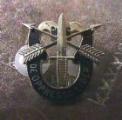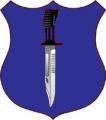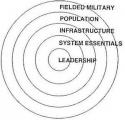
Originally Posted by
JPub 1-02
engagement — . . . 2. A tactical conflict, usually between opposing lower echelons maneuver forces. See also battle; campaign
campaign — A series of related major operations aimed at achieving strategic and operational objectives within a given time and space. See also campaign plan. (JP 5-0)
campaign plan — A joint operation plan for a series of related major operations aimed at achieving strategic or operational objectives within a given time and space. See also campaign; campaign planning. (JP 5-0)
campaign planning — The process whereby combatant commanders and subordinate joint force commanders translate national or theater strategy into operational concepts through the development of an operation plan for a campaign. Campaign planning may begin during contingency planning when the actual threat, national guidance, and available resources become evident, but is normally not completed until after the President or Secretary of Defense selects the course of action during crisis action planning. Campaign planning is conducted when contemplated military operations exceed the scope of a single major joint operation. See also campaign; campaign plan . (JP 5-0)
major operation — A series of tactical actions (battles, engagements, strikes) conducted by combat forces of a single or several Services, coordinated in time and place, to achieve strategic or operational objectives in an operational area. These actions are conducted simultaneously or sequentially in accordance with a common plan and are controlled by a single commander. For noncombat operations, a reference to the relative size and scope of a military operation. See also operation. (JP 3-0)
operation — 1. A military action or the carrying out of a strategic, operational, tactical, service, training, or administrative military mission. 2. The process of carrying on combat, including movement, supply, attack, defense, and maneuvers needed to gain the objectives of any battle or campaign.
operational art — The application of creative imagination by commanders and staffs — supported by their skill, knowledge, and experience — to design strategies, campaigns, and major operations and organize and employ military forces. Operational art integrates ends, ways, and means across the levels of war. (JP 3-0)
operational level of war — The level of war at which campaigns and major operations are planned, conducted, and sustained to achieve strategic objectives within theaters or other operational areas. Activities at this level link tactics and strategy by establishing operational objectives needed to achieve the strategic objectives, sequencing events to achieve the operational objectives, initiating actions, and applying resources to bring about and sustain these events. See also strategic level of war; tactical level of war. (JP 3-0)
tactical level of war — The level of war at which battles and engagements are planned and executed to achieve military objectives assigned to tactical units or task forces. Activities at this level focus on the ordered arrangement and maneuver of combat elements in relation to each other and to the enemy to achieve combat objectives. See also operational level of war; strategic level of war. (JP 3-0)
strategic level of war — The level of war at which a nation, often as a member of a group of nations, determines national or multinational (alliance or coalition) strategic security objectives and guidance, and develops and uses national resources to achieve these objectives. Activities at this level establish national and multinational military objectives; sequence initiatives; define limits and assess risks for the use of military and other instruments of national power; develop global plans or theater war plans to achieve those objectives; and provide military forces and other capabilities in accordance with strategic plans. See also operational level of war; tactical level of war. (JP 3-0)





 Reply With Quote
Reply With Quote












Bookmarks